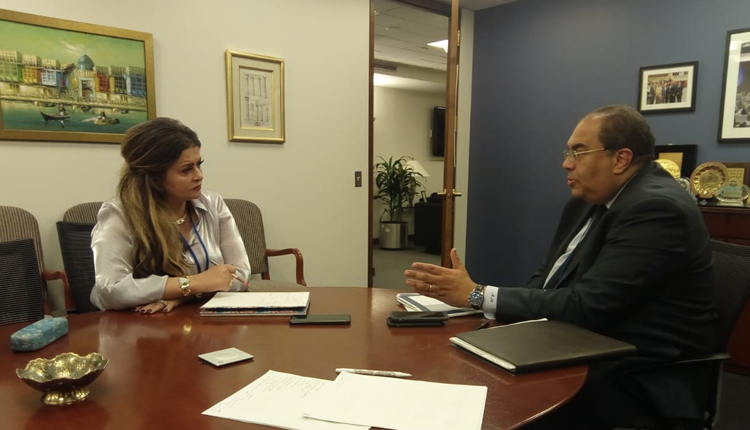Egypt needs 8% growth so citizens could feel the change: World Bank official
The Egyptian economy is witnessing growth rates higher than the global average, Mahmoud Mohie el-Din, the World Bank Group’s senior vice president for the 2030 Development Agenda, United Nations Relations, and Partnerships said.
However, Egypt needs to achieve growth rates ranging between 7-8 percent over eight years to make the people feel a real change, Mahmoud Mohie el-Din told Amwal Al Ghad on the sidelines of the IMF/World Bank annual spring meetings.
“The higher population Egypt has, the higher economic rates are needed to achieve.” Mohie el-Din said.
Achieving an 8 percent growth rate could double the national income in less than 10 years and the citizen would feel its results if translated into services, the World Bank official added.
The Egyptian government has taken bold steps towards achieving these rates following the implementation of an economic reform programme in November 2016 to regulate the general fiscal policy and boost the economic activity, he added.
Egypt embarked a number of bold reforms, including the liberalisation of exchange rates and the elimination of the black market, as well as reducing the budget deficit and the amount of debt, the senior official pointed out.
The Egyptian economy needs to re-review controls of the main markets, namely the labour market, the trade market, the capital market in the broad sense, including the banking and non-banking sectors. It also needs to introduce more innovative development in general especially in the light of the approach to Disruptive and Transformative Technologies that was published by Development Committee at the World Bank/IMF Spring Meetings 2019.
The global outlook foresees a moderate slowdown in economic activity, as global trade growth has weakened, investment prospects have softened, debt vulnerabilities persist, and policy uncertainty weighs on confidence, Mohie el-Din said. These factors are affecting advanced economies’ growth rates more than the developing economies’.
He added that the economic growth rates were lower in the developed countries, while it was little better in developing countries. Whereas the growth rates in the developing countries were estimated by 4.4 percent slightly more than average global growth rates by one percent.
However, the growth rates in the MENA region recorded between 2.5 percent and 3.5 percent which mean any state could achieve higher growth rates through increasing the local demand, pushing forward investment in the infrastructure or increasing exports.
The World Bank said that extreme poverty has recorded 700 million at the last count equivalent to 10 percent of the world’s population, however the percentage of poverty increased from 2.6 percent to 5 percent in the Arab countries within three years. Such problem affects achieving sustainable development goals.
World Bank Group’s senior vice president for the 2030 Development Agenda further confirmed the that the International Monetary Fund estimates that the governments are required to increase their public spending to achieve sustainable development goals especially in education, health, energy, transport and water to $2.6 trillion annually.
He added that Egypt which is considered a middle-income country needs an increase in its public spending by at least 50 percent annually in order to achieve sustainable development goals, whereas the Low-income countries need to increase their public spending by 14 percent annually.
He futher told Amwal Al Ghad that the tax revenues rates which represent 15 percent lower than Egypt’s GDP is considered to be a big problem, referring that the percentage is very low. He added that It is related to the efficiency of collection, evaluation and follow-up, not necessarily the imposition of new tax charges.
Mohie el-Din added that the state should improve the conditions of informal sector a step that should be taken through boosting the formal sector first. There should also make more room for the private sector in releasing development and investment. It should improve the business investment climate, in this regard, distinguished models such as Colombia and Rwanda have succeeded in attracting private investment, which has contributed to strengthening the fiscal system and raising revenues.
The World Bank Group’s senior vice president pointed out that Egypt cannot solely depend on a particular type of investment, to satisfy the needs of state with population of 100 million citizens, the country should open the door for investments in all its forms.
Last year, foreign direct investment into the Egyptian market has dropped sharply recording 27 percent when compared to year earlier, the largest decline was among the developed countries, he noted.
Mohie el-Din recommended that Egypt strongly needs to promote investment after relying on traditional incentives for long.


